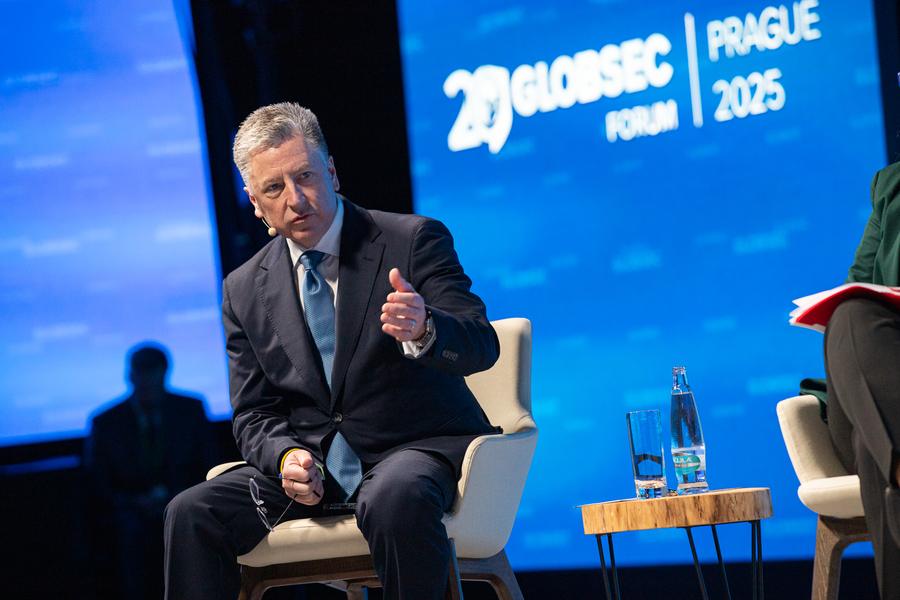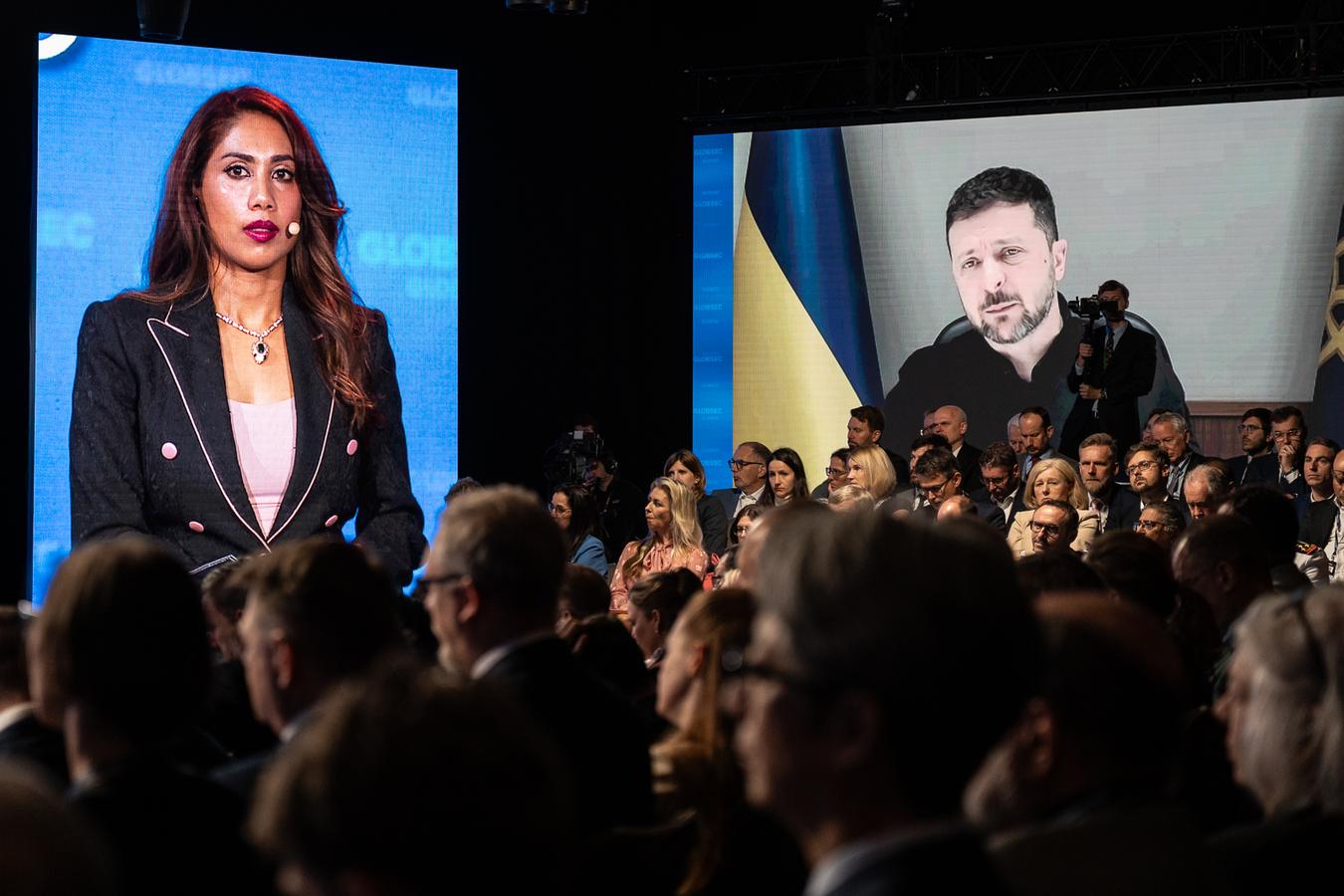Russia’s war against Ukraine took center stage at this June’s GLOBSEC conference in Prague. The high-profile political gathering was a witness to the death of Ukraine’s victory plan, replaced with ceasefire rhetoric and frozen conflict scenarios following the election of Donald Trump to US president.
It is, however, universally accepted that this frozen conflict is not a step to peace, as it would allow Russia to re-arm and re-attack, most likely, on a greater scale. However, Ukraine may ultimately face few other options, as the West hesitates to make decisive steps to turn the tide.
A frank post-panel exchange with former US Special Representative for Ukraine Kurt Volker succinctly revealed the real reason for the West’s hesitation: nukes. Illustrating how deeply Russia’s nuclear threats have shaped Western policy constraints, he argued that a frozen conflict represents Ukraine’s best realistic outcome because direct confrontation with Russia “would become a nuclear war and annihilate everybody.”
When pressed on why the collective West cannot prevent this scenario despite Ukraine facing ongoing human rights violations and cultural erasure in occupied territories, Volker’s response was stark: “The reason is quite obvious. It’s because a direct war against Russia would become a nuclear war.”
The exchange exposes how senior Western officials have internalized Moscow’s nuclear blackmail— arguably the Kremlin’s greatest weapon—as an insurmountable constraint on Ukraine support, inadvertently enabling the proliferation of instability around the globe. Volker, who served as US envoy to Ukraine during Trump’s first presidency, grew visibly frustrated when challenged on the implications of this logic, ultimately ending the conversation when questioned about Western hesitation to allow strikes on Russian territory.
EP: Right now, you mentioned a ceasefire and a standoff as the best-case scenario for Ukraine. And I’m wondering how that factors in with expert analysis that would allow Russia to rearm and re-attack Ukraine and beyond. How does that factor in with the human rights violations ongoing in occupied territories and erasure of national identity? And how do we prevent a Minsk Three that essentially allowed Russia to stage this larger war? How can we call it a best-case scenario in this case?
Volker: Well, because all the other scenarios are worse. And of course, Russia is going to rearm, regroup, and plan to attack again. No one should have any other expectations. And the key thing is to make it so difficult for Russia, painful for Russia, that we can deter Russia from actually doing it.
They are going to rearm, but if they find that it’s going to be too costly, too painful for them, we can stretch out that timeline indefinitely as to when they attack.
This is what we did during the Cold War with the Soviet Union from 1945 up until the Soviet Union collapsed. So that, I think, is the best we’re going to be able to do.
And meanwhile, that buys time for us to work together to strengthen Ukraine politically, economically, and militarily. And eventually, Russia is going to have to change because Putin will not live forever.
The way that they have gone about this aggression, not only against Ukraine but elsewhere as well, is not sustainable. And I think that they are going to have to come to terms with what they have done. And we’re going to have to put up basically a wall to protect ourselves against them.
EP: It appears that this scenario means that essentially Ukraine loses the occupied territories forever, because the return of any connection to Ukraine is ongoing, and there is no reason to expect that they will not be just integrated into Russia beyond repair.
Volker: I don’t agree with that. We had a divided Germany for 40 years, which was eventually unified. We had the Baltic states occupied by the Soviet Union for 40 years, which got their independence back.
I don’t think we can predict how things will go in the future. And I don’t think anyone should recognize these as legitimately Russian territory. They’re not. And you’re absolutely right that things will happen during occupation that are absolutely horrible. But again, we have to think, so what is the other alternative? I don’t see one.
EP: That is a great remark. Why is there no alternative? Why is the collective West not strong enough to prevent the scenario? I don’t agree with the Germany analogy. The Soviet Union was not there to brainwash the Germans out of believing that they’re Germans. Meanwhile, it is doing that in Ukraine because that is the objective of Russia.
Volker: That is the objective of Russia. And the reason is quite obvious. It’s because directly launching a war against Russia would become a nuclear war and annihilate everybody. And no one wants to do that.
EP: But why are we so confident in this scenario?
Volker: In which?
EP: In the scenario of a nuclear war, because that is Russia’s greatest advantage, fear-mongering of a nuclear war.
Volker: Well, as long as we are not threatening the existence of Russia as a state and trying to do regime change in Russia, I don’t believe they’re going to use nuclear weapons. But if we are in a full-scale war with Russia, they will use nuclear weapons. I don’t see why we would doubt that.
EP: Why? But what reason do we have to say that?
Volker: Because it’s in their doctrine and they have the actual missiles themselves.
EP: But multiple assessments have shown that Putin wants self-preservation as well. You can’t play with nuclear weapons. The US would not do that.
Volker: Putin is not always rational. If he were rational, he wouldn’t have started this war to begin with. And they have the capability. And no one in the West is going to say, yeah, let’s risk it. Let’s go to war with Russia and see what happens.
EP: That essentially gives a carte blanche for any country with nuclear weapons to do whatever they want.
Volker: No, that’s not true. Because Putin is not going to use nuclear weapons unless he is faced with that threat to the state. So, you know, we have conventional means, we have sanctions means, we have lots of ways to deter nuclear use and lots of ways to push back on Russia, which we need to do.
EP: Mr. Volker, but during these three years of war, Russia has repeatedly threatened the use of nuclear weapons, claiming a risk to its state. For instance, when Ukraine liberated the territories that Russia occupied. And nothing followed.
Volker: That’s baloney. They know themselves that these are not Russian territories, and so that’s just posturing. Ukraine is attacking Russian territory on a daily basis, and this is one of the red lines that the West is afraid to cross precisely because of this nuclear threat. Because if the West were attacking and defeating Russia, they would use nuclear weapons. With Ukraine doing this, they’re not going to do that.
EP: Ukraine is also posing a threat to the Russian state.
Volker: Not really. Certainly. Not really. You’re threatening to weaken their military to a point where they can’t continue fighting, but you are not threatening to take over the Russian state or to topple the Kremlin. And they know that.
EP: But why is the West so afraid to allow strikes in Russian territory? Is it precisely because of fear of nuclear threats?
Volker: I wouldn’t say we are afraid to allow strikes on Russian territory. In fact, Ukraine has been doing this, as you said, almost every night now, and you don’t hear anything from the West.
EP: Yes, but the West is not joining in, and there has been a three-year hesitation on allowing any sort of strikes.
Volker: You’re asking the same question again and again, and I don’t think I’m going to give you a different answer. So, nice to meet you, and thank you. Good luck.
This exchange took place following a panel discussion on Ukraine’s future at a security forum. Volker served as US Special Representative for Ukraine Negotiations from 2017-2019 and US Ambassador to NATO from 2008-2009.





